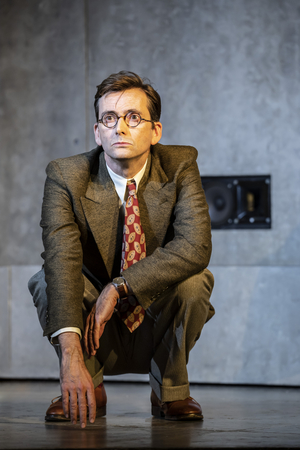Review: GOOD, Harold Pinter Theatre
Dominic Cooke's revival quietly highlights the dangers of populism

![]() From Dennis Nielsen to DJ in Don Juan In Soho, to the murderous vicar in the BBC's Inside Man, David Tennant seems drawn to playing the antihero. As Professor John Halder, in CP Taylor's 1982 play GOOD, he captures the moral downfall of an ordinary man who gradually embraces the Third Reich.
From Dennis Nielsen to DJ in Don Juan In Soho, to the murderous vicar in the BBC's Inside Man, David Tennant seems drawn to playing the antihero. As Professor John Halder, in CP Taylor's 1982 play GOOD, he captures the moral downfall of an ordinary man who gradually embraces the Third Reich.
Halder is a lecturer in literature. The play opens as he is living in pre-war Frankfurt with his family, managing his mother's developing dementia and confiding troubles to Maurice, his "only friend" who happens to be a Jew. Halder tells him that he hears distracting music in his head at times of heightened emotion; this provides a soundtrack to his life that he shares with the audience.
Halder is a pretty normal guy, but not necessarily 'good'; he cheats on his wife and is indifferent to the impending evil of Facism in the face of his friend's worry. He shouts at his sick mother, even writing a book discussing euthanasia for elderly people with dementia. It is this that brings him to the attention of the Nazi party.
David Tennant is excellent as Halder; convincing in his insouciance that the Nazis will not continue with their persecution of the Jews. He never really believes in what is going on, as long as it doesn't touch him personally; books can be burnt as long as they are not his copies, Jazz can be played by his Nazi comrades even though it is banned as 'jungle' music. He is not a man indoctrinated by Nazi philosophy so much as a someone who wakes up to find himself an intrinsic part of it.
Taylor's play is, of course, an exposition of the horror of the Holocaust, but it is also a quietly visceral and complex examination of the deconstruction of a man's morality and values. Halder is indifferent and distant and fails to challenge what is happening: this is a stark warning against sleepwalking into a populist rhetoric.
Elliot Levey and Sharon Small play friend Maurice and wife Helen, as well as a range of other small parts. Levey is wonderful as Maurice; an intelligent and patriotic German who recognises the impending threat, but is powerless to stop it. Levey gives Maurice complete realism and heart. Small is distant and distracted as wife Helen, moving deftly to weak and forgetful as Halder's mother.
Dominic Cooke's direction keeps all actors on stage throughout, allowing for the quick changes in characters. The first act needs a little more pace, but the second half feels perfectly done; allowing the horror of the story to softly unfold.
Vicki Mortimer's design is stark and plain, with blank concrete walls, no windows and no props except an avalanche of books coming down a shute in the wall, to be thrown on a bonfire through a hole in the other side; it is incredibly effective and affecting.
Tom Gibbons sound design creates wine being poured and pages being turned, but is most powerful in the roar of breaking glass and screams as we listen to the action on Kristallnacht in complete darkness.
Taylor's writing cleverly shows the seduction of an ideology we now see as abhorrent, if we are lazy or indifferent enough not to challenge it. In the turmoil of today's world, it is this that is the truly frightening thing.
GOOD is at the Harold Pinter Theatre until 24 December
Photo Credit: Johan Persson


